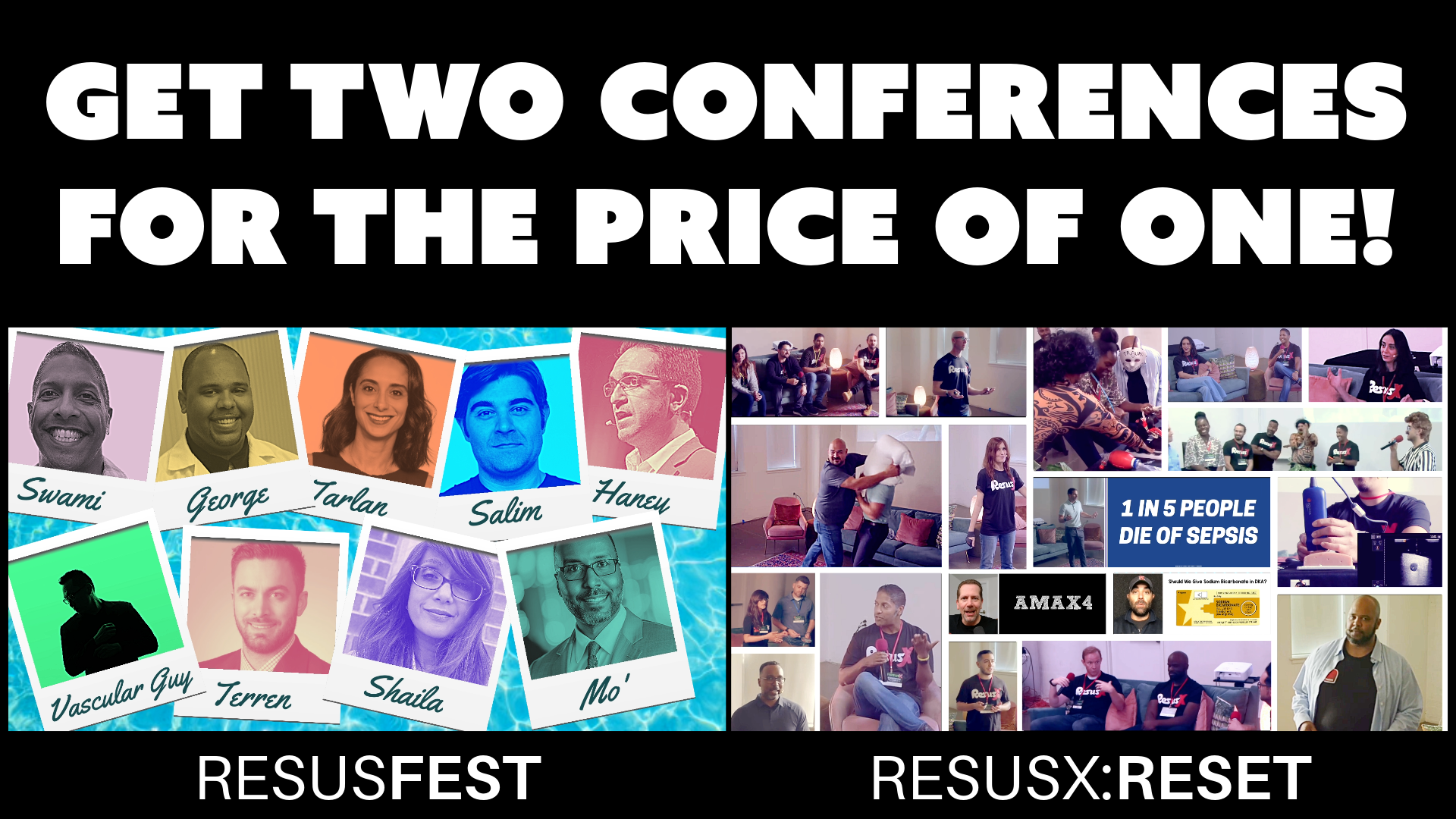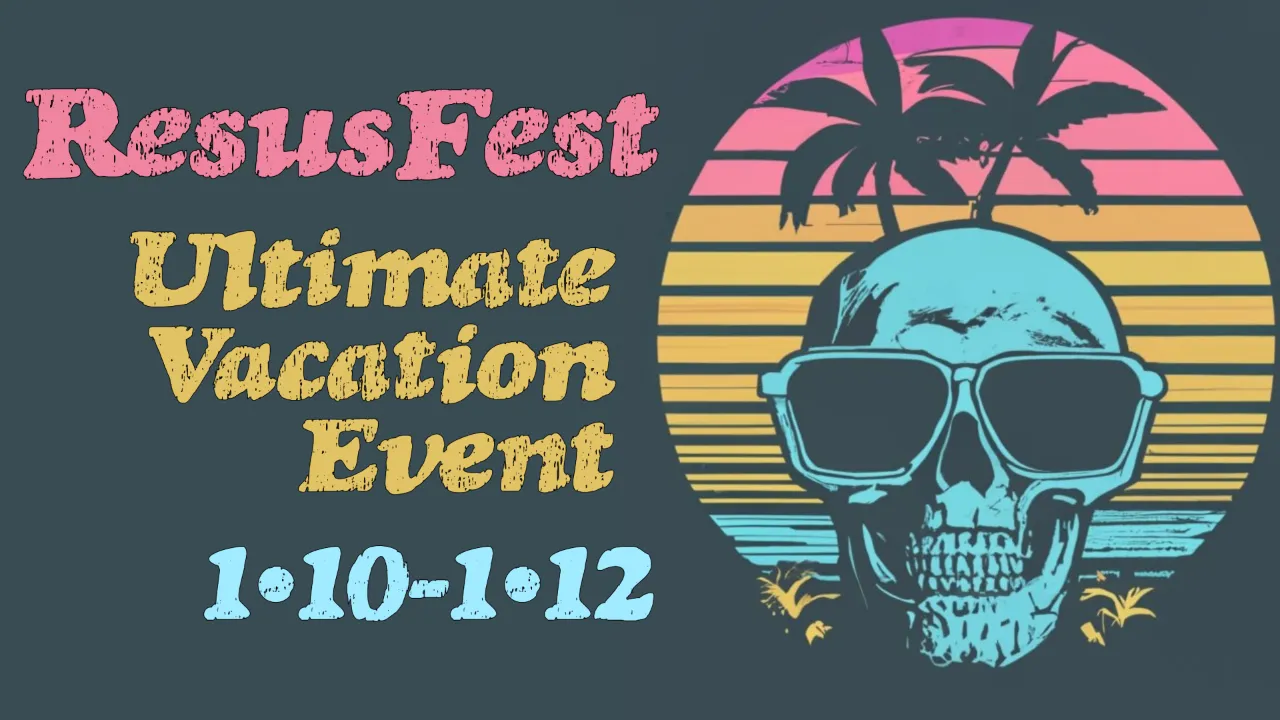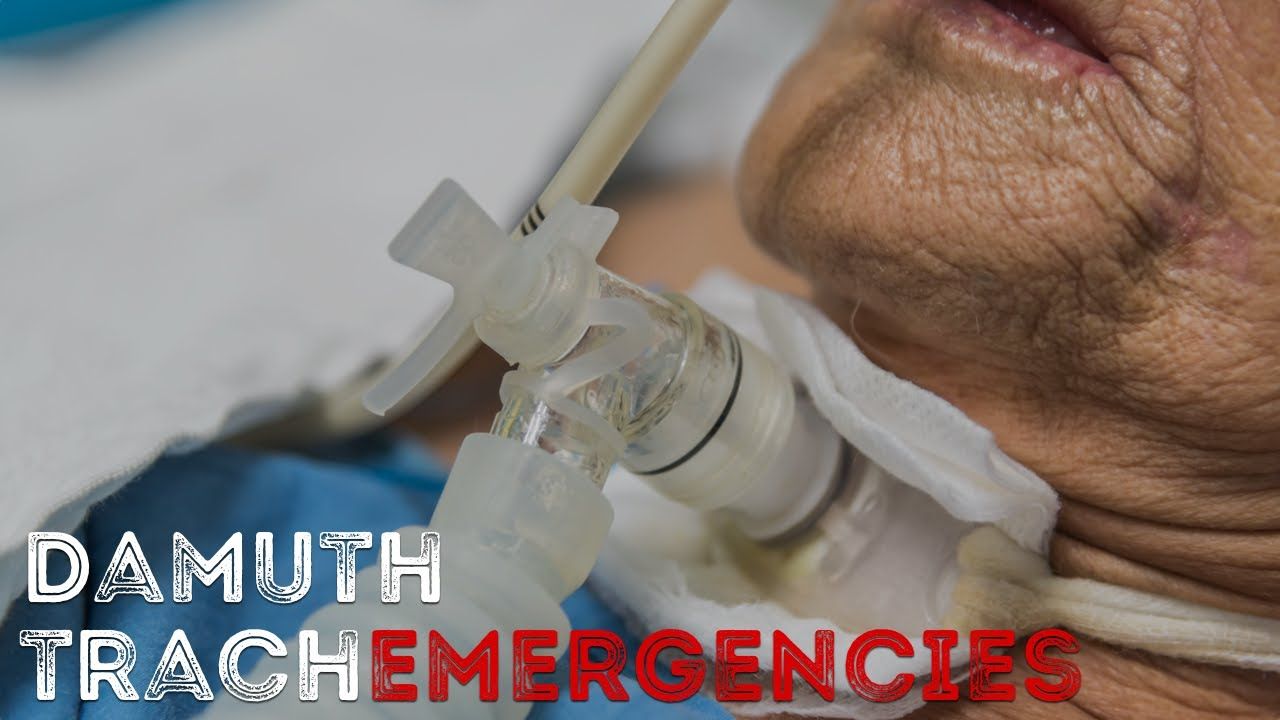
The Educational Newsletter From CriticalCareNow!
Welcome to this week's newsletter. We've got a ton of stuff to cover with you, so let's get right to it.
- Get ResusX:Reset for free when you register for ResusFest
- A quick tip for the tip of the wire during a central line placement
- Sara Crager is talking vasopressors
- Trach emergencies from Emily Damuth
- APRV is sexy in critical care, but is there evidence? Check out this debate
- Chris Reilly is talking hemorrhage control
This week's newsletter is fired up and ready to go, so let's get it started with Last Week Now!


Bask in Sunshine, Skills, and Serenity at Our Premier Resort!
As the chill of January envelopes us, let us be the ray of sunshine that pierces through. Introducing once again, ResusFest, our pinnacle vacation conference. This year, it’s not just the sunlit ambience of the all-inclusive Andaz Mayakoba resort that’s special, but also a galaxy of expert minds ready to illuminate your learning. Eager to know our eminent faculty? Stay tuned; more names will be unveiled soon!
Double the Knowledge, Double the Fun: A Two-for-One Offer!
Here's a deal to make your experience even richer: Register for ResusFest right now and get complimentary access to ResusX on replay! That's right, two groundbreaking conferences at the price of one. This deal ends this Friday so don't delay!
Dive Deep with ResusFest
Our vision for ResusFest has always been to foster a vibrant, interactive learning ambience. With only 50 slots, now narrowed down to 36, anticipate sessions ranging from intimate group dialogues and compelling debates to concise lectures. Our hands-on workshops are back with a splash – introducing the "Scan in the Sand: Ultrasound Workshop" and the "Lines in the Sand: Vascular Access Workshop". ResusFest isn't just another conference; it's a transformative learning journey.
More than Just Learning: Discover, Relax & Revive
While we promise an academic feast, ResusFest is also your ticket to serenity and adventure. Indulge in gourmet dinners beneath the starry canopy, exhilarating beach escapades, and revitalizing morning yoga. It’s the perfect melange of professional growth and soulful relaxation.
A Unique CME / CEU Opportunity
Enhance your resuscitation skills and return with a glowing tan! We're open for registrations, so why wait? Reserve your spot at ResusFest and redefine your January in style. Special discounts for residents, nurses, and APPs. For further details, reach out to [email protected].


Just The Tip (of the wire)
Have you ever tried to thread that seldinger wire into the catheter but your hands are a little shaky? Check out this little trick for stabilization of the wire that I use when placing central lines.
Check out the video here.


Picking a Pressor
In this episode, Dr. Sara Crager discusses the complexities of selecting vasoactive medications, known as "pressors," for patients in shock. She emphasizes the importance of not just memorizing tables but understanding the underlying principles of why, when, and which pressor to use. Dr. Crager points out the limitations of relying solely on evidence-based medicine for such decisions, highlighting the uniqueness of each patient and the importance of considering provider expertise. She explores various factors, including the need for vasoconstriction, vasodilation, increased inotropy, and concerns about side effects like arrhythmias and pulmonary pressures, to guide the thoughtful selection of the most suitable pressor or combination of pressors to improve tissue perfusion in shock patients.
Check out her amazing video now! Explore ResusX for more content from Sara and our other exceptional faculty!

Tracheostomy Emergencies by Dr. Emily Damuth
Dr. Damuth is an Intensivist as well as and Emergency physician. In this video from ResusX:2019 she goes over all the things that you should know when approaching a patient with a tracheostomy who presents with an airway emergency. Here's a summary:
Here's a summarized version of the transcript "Tracheostomy Emergencies" in 5 bullet points:
1. Tracheostomy patients, especially those facing emergencies, can be among the most challenging to treat in the emergency department.
2. An algorithm has been developed to systematically approach any tracheostomy patient with respiratory distress. This includes procedures like applying oxygen, clearing obstructions, and potentially replacing the trach tube.
3. In the U.S., there are approximately 110,000 tracheostomies performed annually, with 40-50% of tracheostomy patients experiencing complications. Catastrophic airway complications occur in 1% of tracheostomy patients.
4. It's essential to understand the components of a tracheostomy tube, including the outer cannula, inner cannula, and obturator, to effectively manage any complications.
5. When facing a tracheostomy emergency, using the algorithm, which includes steps like applying oxygen to both the face and neck, can help healthcare professionals navigate the situation and provide appropriate care.
Watch the video and be ready for your next patient with a trach!


Get The Official ResusX:Reset T-Shirt
If you don't have one of these soft and comfortable ResusX t-shirts then you are missing out. This t-shirt tell everyone in the room that you are bringing cutting edge resuscitation skills to the code.
This shirt comes only in black and is available in multiple sizes. The material is lightweight, breathable, and incredibly comfortable. Wear it in a resuscitation, goring to the store, or just chillin' at home. Everyone loves this shirt and you can get your very own today.




The Great APRV Debate
In this podcast episode titled "The Great APRV Debate," the hosts, Rory Spiegel and Max Hockstein, engage in a passionate debate about the use of Airway Pressure Release Ventilation (APRV) in critical care. They discuss the controversy surrounding when and how APRV should be employed, examining various aspects of the mode and its potential benefits and drawbacks.
Five key takeaways from the debate are as follows:
- Controversy Surrounding APRV: The podcast highlights the ongoing debate within the medical community regarding the appropriate use of APRV. Some argue for its selective use in specific cases, while others advocate for its broader application in mechanically ventilated patients.
- Lack of Clear Evidence: Both sides acknowledge the limited and somewhat inconclusive evidence regarding the efficacy of APRV. They discuss the challenges in conducting rigorous studies on APRV and note that there is no large-scale randomized control trial supporting its widespread use.
- Hypercapnia and Respiratory Acidosis: The hosts delve into the importance of managing hypercapnia in ARDS patients and the potential consequences of allowing significant respiratory acidosis. They discuss the need for careful control of minute ventilation when using APRV.
- Hemodynamic Considerations: The debate includes a discussion on the impact of APRV on hemodynamics, with a focus on right ventricular strain and pulmonary vascular resistance. The hosts explore how APRV can affect these parameters and whether it is a safe mode for patients.
- Training and Familiarity: The hosts emphasize the need for healthcare professionals to become familiar with APRV through education and practice. They acknowledge that it may require a learning curve but stress the importance of building expertise in using the mode safely and effectively.
Overall, the debate provides valuable insights into the ongoing discussions and considerations surrounding the use of APRV in critical care, highlighting the need for further research and the development of best practices in its application.
This podcast is for members only so if you want to listen to the full episode, sign up for membership down below.


Chris Reilly is a guitar-swinging, song-singing, education-bringing physician from NYC. Follow at @docreilles on Instagram and TikTok. Let's see what Chris has for us this week.
Hemorrhage Control 101
Addressing hemorrhage control in trauma is key! Massive hemorrhage is the leading preventable cause of all trauma-related deaths so today we’re going to hammer home some concepts. First off, let’s switch from the conventional ABCs (Airway, Breathing, Circulation) approach to CCAB (Circulation, Control of Hemorrhage, Airway, Breathing). This can lead to a substantial reduction in hemorrhage-related deaths.
All shock in trauma should be assumed to be hypovolemic shock due to massive hemorrhage until proven otherwise. Start your Massive Transfusion Protocol (MTP) early in your tachycardic and/or hypotensive trauma patients. Remember, when initiating MTP to keep an eye on the calcium levels as Citrate in the transfused blood can severely decrease your patient’s Calcium. You can also look for evidence of QT prolongation to monitor hypocalcemia from MTP. You can also classify your patient’s blood loss with an easy-to-remember mnemonic relating percent blood loss/Class of hemorrhagic shock to a tennis match! 0-15 (Class 1), 15-30 (Class 2), 30-40 (Class 3), 40-match (Class 4)! Subsequent changes per class: Class 1 (no vital sign changes), Class 2 (elevated HR), Class 3 (decreased BP and tachypnea), and Class 4 (altered mentation). BOOM!
Keep in mind some basic techniques for hemorrhage control including direct pressure, wound packing, pelvic binders, and management of long bone fractures. When aiming for adequate blood pressure, most trauma intensivists prefer permissive hypotension in bleeding patients. So, avoid aggressive crystalloid resuscitation, make sure you have early use of blood products, and consider using tranexamic acid within three hours of reporting trauma (CRASH2 &3 trials). TXA does NOT increase clotting. It’s an antifibrinolytic, preventing the breakdown of clots, not a clot former…
That was a lot to unpack… Check out the full article for a deeper dive into Critical Care Now by Dr. Shyam Murali and Dr. Mohamed Hagahmed.


Join the ResusNation and Get Tons of Content For Less Than a Cup of Coffee
Signup for the ResusNation today and see why over 500 resuscitationists are members. As a ResusNation member you will receive extra content from CriticalCareNow such as live digital teaching sessions, podcasts, free video lectures, a library of grand rounds, and so much more. Check out the memberships options available below and pick the one that is right for you.
There's nothing to think about, you'll be automatically billed monthly and cancel anytime....no questions asked! Looking for a deal? Pay for a yearly pass and get one month free!

ResusNation: Basic Membership (Monthly)
Show your support with our basic membership.
-
Access to 2 cutting edge lectures monthly from world-renowned speakers every month
-
Unlimited viewing of videos
-
Ability to watch on a desktop or mobile video player
-
Pay for a monthly or yearly membership
-
CEUs available

ResusNation: All-Access Pass (Monthly)
The ULTIMATE membership! In addition to everything in the basic plan, you'll also receive:
-
5 cutting-edge lectures monthly from world-renowned speakers
-
Exclusive weekly podcasts
-
Attend the exclusive Q & A session with Grand Round speakers
-
Access our Grand Rounds library and watch previous episodes on replay.
-
Watch every Chawk Tawk on replay
-
Join our twice-monthly hangouts where you can hang out and ask us anything
-
Access the ResusX Community, a forum for questions, post cases, & interact and network with others
-
Receive CEU credits for the content that you watch
-
Pay for a monthly or yearly membership

ResusNation: Basic Membership (Yearly)
Show your support with our basic membership.
-
Pay for the year and get one month FREE!
-
Access to 2 cutting edge lectures monthly from world-renowned speakers every month
-
Unlimited viewing of videos
-
Ability to watch on a desktop or mobile video player
-
Pay for a monthly or yearly membership
-
CEUs available

ResusNation: All-Access Pass (Monthly)
The ULTIMATE membership! In addition to everything in the basic plan, you'll also receive:
-
Pay for the year and get one month FREE!
-
5 cutting-edge lectures monthly from world-renowned speakers
-
Exclusive weekly podcasts
-
Attend the exclusive Q & A session with Grand Round speakers
-
Access our Grand Rounds library and watch previous episodes on replay.
-
Watch every Chawk Tawk on replay
-
Join our twice-monthly hangouts where you can hang out and ask us anything
-
Access the ResusX Community, a forum for questions, post cases, & interact and network with others
-
Receive CEU credits for the content that you watch
-
Pay for a monthly or yearly membership




